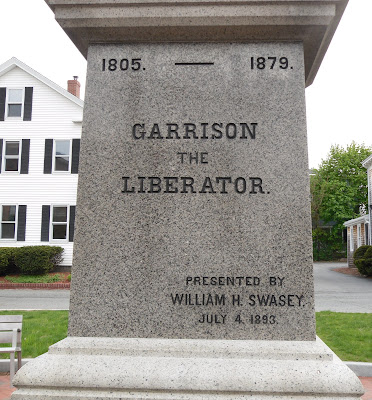'IN THIS HOUSE WAS BORN
DECEMBER 10, 1805
WILLIAM LLOYD GARRISON
---------------------------------------------
---------------------------------------------
THIS TABLET ERECTED BY
THE CITY IMPROVEMENT SOCIETY
OF NEWBURYPORT
DECEMBER 10, 1905'
'HISTORIC SITE IN JOURNALISM
WILLIAM LLOYD GARRISON
BORN HERE IN 1805, FOUNDED THE LIBERATOR, ANTISLAVERY JOURNAL, JANUARY 1, 1831, AND DECLARED: "I AM IN EARNEST. I WILL NOT EQUIVOCATE. I WILL NOT EXCUSE. I WILL NOT RETREAT A SINGLE INCH. AND I WILL BE HEARD."
MARKED THIS 24TH DAY OF JUNE 1980 BY
THE SOCIETY OF
THE SOCIETY OF
PROFESSIONAL JOURNALISTS
SIGMA DELTA CHI'
There are two information panels to the rear, of which the one to the left of the statue reads:
'William Lloyd Garrison was born in 1805 on School Street in Newburyport. His family experienced deep poverty after his sailor father, Abijah Garrison, deserted them in 1808, At age five, Garrison sold candy on the streets and begged for food at the houses of the wealthy, and then worked making shoes and cabinets as a boy. Garrison's mother, Fanny, moved to Lynn and other cities looking for work, while Garrison grew up in Newburyport living with friends. She died in 1823 when he was 17. At age 12 Garrison became an apprentice at The Newburyport Herald. He was almost entirely self-taught, learning reading and writing plus the business of printing and journalism, and was soon promoted to foreman. At 20, he established his own newspaper called Newburyport Free Press. His zeal for reform antagonized his fellow citizens and the newspaper failed. Five year later, he established his long-running anti-slavery newpaper The Liberator in Boston.
'In 1830 Garrison returned to Newburyport to make an abolitionist speech at the Congregational Church on Brown Square. Many strongly disapproved, and the congregation refused to allow him back for his next scheduled address. In 1836, the Essex County Anti-Slavery Society tried in 1837 to hold an anti-slavery convention in a garden off of Brown Square, a mob broke up the meeting, beating tin pans, blowing horns, cutting the buttons off the coat of one of speakers [sic], and throwing rotten eggs and sticks.
'Although several residents participated in the Undergound Railroad, much of Newburyport was conservative and not supportive of Garrison or the Abolitionists during the pre-war period. In 1859, Representative Spofford of Newburyport spoke out against abolitionists' 'constant and useless agitation of the slavery question'. After the Civil War, however, Garrison was generally hailed as a prophet in the North. In 1893, fourteen years after his death in 1879, Newburyport erected a bronze statue honoring him here in Brown Square.'
The information panel on the righthand side of the statue states:
'William Lloyd Garrison (1805-1879) was a prominent spokesman for the American Abolition Movement, forcefully advocating for the unconditional eradication of slavery. Garrison also strongly supported women's equality and suffrage (a position which split him from many fellow Abolitionists), and denounced discrimination, alcohol, and New England churches for not taking a strong stand against slavery.
'Garrison's national reputation as a radical began in 1829, when he publicly challenged the wealthy Newburyport merchant Francis Todd as a "highway robber and murderer", and wrote that his captain Nicholas Brown should be "sentenced to solitary confinement for life" for shipping about 80 slaves chained below deck. Garrison was charged with libel and jailed for 44 days.
'In 1831, Garrison founded the anti-slavery newspaper The Liberator. Although he barely made a living, he published the paper for more than three decades, and founded the New England, Massachusetts, and American Anti-Slavery Societies. Harsh, brilliant, militant, and articulate, Garrison thrived on controversy over one of the most crucial moral issues in American history. He characterized the American Constitution as a "covenant with death" and an "agreement with hell" for its partial embrace of slavery, and publicly burned a copy in 1854. Far ahead of most white Americans, Garrison rode in segregated rail cars with his African American associates. He also helped to launch the career of the great abolitionist Frederick Douglass in 1841, although he later split with Douglass.
'Garrison eventually embraced the Civil War, although it shattered his utopian principles of pacifism, non-violence, and opposition to voting, as well as his previous advocacy of separatism from the southern states. Today, Garrison is recognized as a prophetic American hero who was central to the transformation of public opinion that ultimately lead [sic] to the freeing of the slaves in the United States.'











No comments:
Post a Comment